八年级英语上册 考点剖析+典题精讲 Module 9《Animals in danger》教案 外研版
初二英语Module9Animalsindanger社知识精讲试题

初二英语Module 9 Animals in danger外研社【本讲教育信息】一. 教学内容:Module 9 Animals in danger二. 重点、难点:动词不定式用法1三. 详细内容:语法知识+课文详解四. 语法知识详解:动词不定式的用法〔一〕当我们要表示“想做某事、需要做某事或者决定做某事〞时,就会出现两个动词连用的情况,这时应如何表达呢?同学们自然会想到want to do sth.,need to do sth. 和decide to do sth. 等表达方式。
主要行为动词后面的动词都采用了“to-+-动词原形〞的构造,我们把这种构造称为动词不定式{有时可以不带to}。
动词不定式没有人称和数的变化,在句子中不能作谓语,那么英语中的动词不定式都可以表示什么意思呢?有什么样的语法功能呢?首先,我们先看一下本模块中所出现的包含动词不定式的句子:〔1〕It was interesting to learn about the Wolong Panda Reserve .理解卧龙大熊猫自然保护区的知识是有趣的。
〔2〕It’s sad to think about that.想起那些让人难过。
〔3〕It isn’t right to kill them. 杀死它们是不对的。
〔4〕Betty was sad to hear about so many animals in danger. 贝蒂听说许多动物处于危险之中感到悲伤。
〔5〕We need to protect our tigers,turtles and snakes. 我们需要保护老虎、海龟和蛇。
〔6〕But many people decide not to think about it. 但是很多人决定不去想这件事。
〔7〕Their water isn’t good to drink. 它们的水不适宜饮用。
〔8〕Our government is working hard to save pandas. 我们的政府正在努力拯救大熊猫。
外研英语八年级上Module 9 Animals in danger
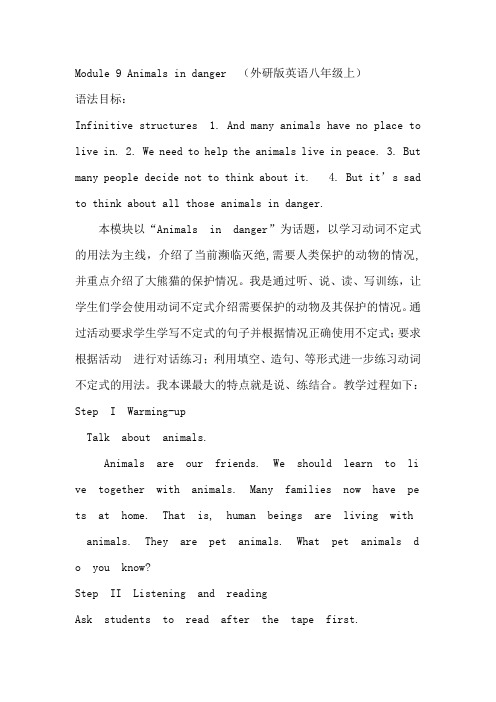
Module 9 Animals in danger (外研版英语八年级上)语法目标:Infinitive structures 1. And many animals have no place to live in. 2. We need to help the animals live in peace. 3. But many people decide not to think about it. 4. But it’s sad to think about all those animals in danger.本模块以“Animals in danger”为话题,以学习动词不定式的用法为主线,介绍了当前濒临灭绝,需要人类保护的动物的情况,并重点介绍了大熊猫的保护情况。
我是通过听、说、读、写训练,让学生们学会使用动词不定式介绍需要保护的动物及其保护的情况。
通过活动要求学生学写不定式的句子并根据情况正确使用不定式;要求根据活动进行对话练习;利用填空、造句、等形式进一步练习动词不定式的用法。
我本课最大的特点就是说、练结合。
教学过程如下:Step I Warming-upTalk about animals.Animals are our friends. We should learn to live toget her with animals. Many families now have pets at home. That is, human beings are living with animals. They are pet ani mals. What pet animals do you know?Step II Listening and readingAsk students to read after the tape first.Ask students to find out the infinitive structures in the conversation and read them together.Pandas have less and less land to live in.Then the pandas will have enough food to eat and enough pla ces to live in.Ask students to make some sentences .Step III教师对动词不定式用法进行小结,然后进行多种形式的练习。
Module9 Animals in danger八年级

主题单元标题Module9 Animals in danger.适用年级八年级所需时间(说明:课内共用3课时,每周9课时;课外共用2课时)主题单元学习概述本模块以"Animals in danger"为话题,以学习动词不定式的用法为主线,介绍了当前濒临灭绝,需要人类保护的动物的情况,并重点介绍了大熊猫的保护情况。
在此基础上,学生可以根据自己的建议制定更合理的动物保护措施;模块同时通过该话题还复习了一般现在时、现在进行时、一般过去时、一般将来时的用法。
主题单元学习目标(说明:依据新课程标准要求描述学生在本主题单元学习中所要达到的主要目标)知识技能:1熟记生词及短语2理解动词不定式作主语,定语,状语等用法过程与方法:以濒危动物图片导入本课学习,通过对话掌握本单元重要知识通过谈论旅游的经历能够读懂有关城市旅游以及方位描述的文章,掌握其细节内容。
情感态度与价值观:通过对濒危动物的了解,增强保护环境和爱护动物的意识对应课标(说明:学科课程标准对本单元学习的要求)专题一1. Key vocabulary 重点词汇danger, protect, orange, cousin, brown, reserve, mad, surprising, kill, absolutely, hard, away, dirty, awful, peace, find out, rare, example, nature, nature reserve, surprised, at last, on earth2. Key structures 重点句式I was so excited to see the pandas at last.It was (not) interesting / sad/ right/ hard to do sth.need/ decide(not) to do sth.The surprising thing was to hear how many animals are in danger.Ability goals 能力目标Enable students to talk about animals in danger.专题二1. Key vocabulary 重点词汇interesting, sad, surprising, surprised, need, hard, place, good, decide, right, to do, hear2. Key structures 重点句式It's (not) + adj. + to do sth.I was surprised to do sth.decide to do sth.need to do sth.a good place to buy thingsThe surprising thing was to hear that bad news.Ability goals 能力目标Enable students to use infinitive correctly.Ability goals 能力目标熟记生词及短语专题三1. Key vocabulary 重点词汇design, jewellery, for example, provide, difficulty, clean, pollute2. Key structures 重点句式It is + adj. + to do sth.The surprising thing was to ...Ability goals 能力目标Enable students to use infinitive correctly.主题单元问题设计1which animals are in danger?2how can we protect animals n danger?专题划分专题一we need to protect animals.专题二The government is working hard to save the pandas.专题三Language in use专题一we need to protect animals.所需课时(说明:课内共用1时,每周8课时;课外共用1课时)专题学习目标(说明:描述学生在本专题学习中所要达到的学习目标,注意与主题单元的学习目标呼应)1. Key vocabulary 重点词汇danger, protect, orange, cousin, brown, reserve, mad, surprising, kill, absolutely, hard, away, dirty, awful, peace, find out, rare, example, nature, nature reserve, surprised, at last, on earth2. Key structures 重点句式I was so excited to see the pandas at last.It was (not) interesting / sad/ right/ hard to do sth.need/ decide(not) to do sth.The surprising thing was to hear how many animals are in danger.Ability goals 能力目标Enable students to talk about animals in danger.专题问题设计1which animals are in danger?2why do people kill whales ?所需教学环境和教学资源(说明:在此列出本专题所需要的教学环境和学习过程中所需的信息化资源、常规资源等和各种支持资源)1. recorder and tape2. videos3.PPT4.all kinds of pictures学习活动设计(说明:为达到本专题的学习目标,从学生的角度设计学生应参与的学习活动。
八年级英语上册-Module-9-Animals-in-danger-Unit-1-We-need-
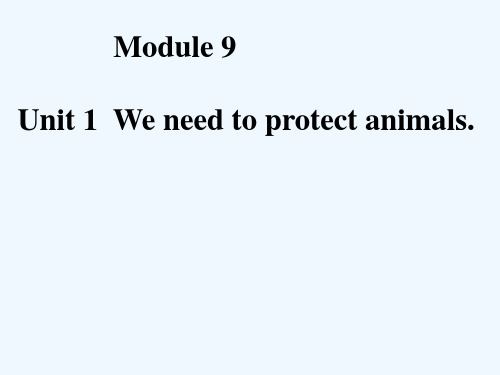
Where do they live? two pandas
卧龙熊猫自然保护区
Wolong Panda Reserve
世界自然基金会
Task 1: Brain-storming! What animals do you know?
animal
Task 2: Guessing game! It is orange and black. It can run very quickly. It likes to eat meat, not grass.
6.5. I am long and thins.n_a_k_e___
7.6. I am big and I have a very long nose.
8. ele_p_h_a_n__t ___
9.7. I can walk a long way without
camel
Task 4: Who has sharp ears?
Now it is your turn! Describe(描述) an animal and let others guess what it is.
Task 3 :Complete the quiz with the words in the box.
bear camel elephant lion snake tiger whale
Task 6:Listening competition!
Q:Why do people kill whales and elephants?
A.They kill them for their meat. B.They kill them for fun. C.They don’t like whales or elephants.
初二英语上册Module 9 Animals in danger(外研版)
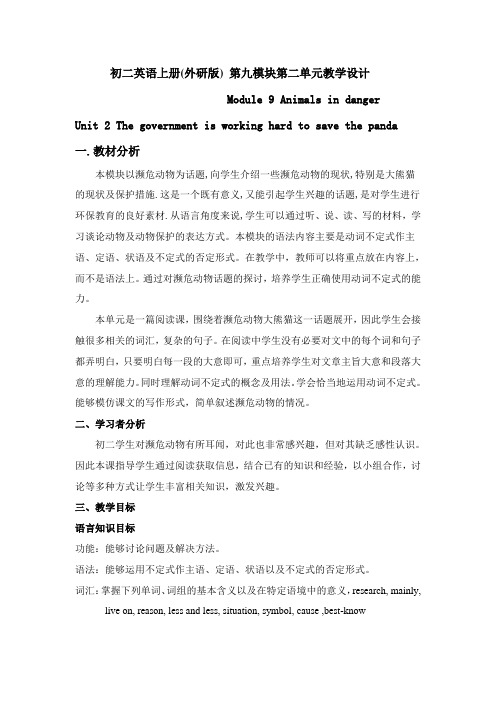
初二英语上册(外研版) 第九模块第二单元教学设计Module 9 Animals in dangerUnit 2 The government is working hard to save the panda 一. 教材分析本模块以濒危动物为话题,向学生介绍一些濒危动物的现状,特别是大熊猫的现状及保护措施.这是一个既有意义,又能引起学生兴趣的话题,是对学生进行环保教育的良好素材.从语言角度来说,学生可以通过听、说、读、写的材料,学习谈论动物及动物保护的表达方式。
本模块的语法内容主要是动词不定式作主语、定语、状语及不定式的否定形式。
在教学中,教师可以将重点放在内容上,而不是语法上。
通过对濒危动物话题的探讨,培养学生正确使用动词不定式的能力。
本单元是一篇阅读课,围绕着濒危动物大熊猫这一话题展开,因此学生会接触很多相关的词汇,复杂的句子。
在阅读中学生没有必要对文中的每个词和句子都弄明白,只要明白每一段的大意即可,重点培养学生对文章主旨大意和段落大意的理解能力。
同时理解动词不定式的概念及用法。
学会恰当地运用动词不定式。
能够模仿课文的写作形式,简单叙述濒危动物的情况。
二、学习者分析初二学生对濒危动物有所耳闻,对此也非常感兴趣,但对其缺乏感性认识。
因此本课指导学生通过阅读获取信息,结合已有的知识和经验,以小组合作,讨论等多种方式让学生丰富相关知识,激发兴趣。
三、教学目标语言知识目标功能:能够讨论问题及解决方法。
语法:能够运用不定式作主语、定语、状语以及不定式的否定形式。
词汇:掌握下列单词、词组的基本含义以及在特定语境中的意义,research, mainly, live on, reason, less and less, situation, symbol, cause ,best-know理解下列单词、词组, nature reserve, turtle, WWF的基本含义以及在特定语境中的意义语音:能够掌握句子的断句。
Module 9 Animals in danger
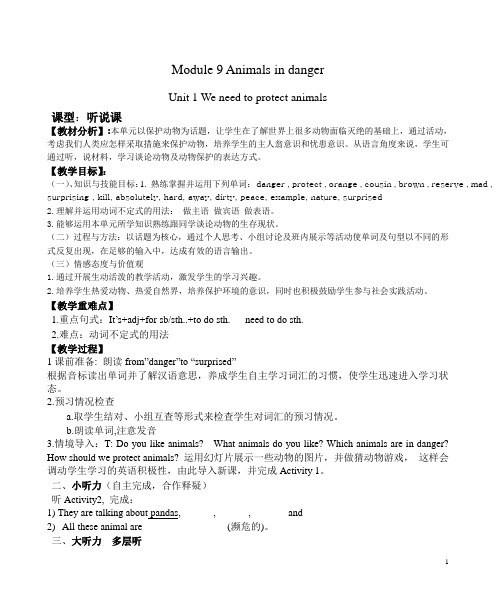
Module 9 Animals in dangerUnit 1 We need to protect animals课型:听说课【教材分析】:本单元以保护动物为话题,让学生在了解世界上很多动物面临灭绝的基础上,通过活动,考虑我们人类应怎样采取措施来保护动物,培养学生的主人翁意识和忧患意识。
从语言角度来说,学生可通过听,说材料,学习谈论动物及动物保护的表达方式。
【教学目标】:(一)、知识与技能目标:1.熟练掌握并运用下列单词:danger , protect , orange , cousin , brown , reserve , mad , surprising , kill, absolutely, hard, away, dirty, peace, example, nature, surprised2.理解并运用动词不定式的用法:做主语做宾语做表语。
3.能够运用本单元所学知识熟练跟同学谈论动物的生存现状。
(二)过程与方法:以话题为核心,通过个人思考、小组讨论及班内展示等活动使单词及句型以不同的形式反复出现,在足够的输入中,达成有效的语言输出。
(三)情感态度与价值观1.通过开展生动活泼的教学活动,激发学生的学习兴趣。
2.培养学生热爱动物、热爱自然界,培养保护环境的意识,同时也积极鼓励学生参与社会实践活动。
【教学重难点】1.重点句式:It’s+adj+for sb/sth..+to do sth. need to do sth.2.难点:动词不定式的用法【教学过程】1课前准备: 朗读from”danger”to “surprised”根据音标读出单词并了解汉语意思,养成学生自主学习词汇的习惯,使学生迅速进入学习状态。
2.预习情况检查a.取学生结对、小组互查等形式来检查学生对词汇的预习情况。
b.朗读单词,注意发音3.情境导入:T: Do you like animals? What animals do you like? Which animals are in danger?How should we protect animals? 运用幻灯片展示一些动物的图片,并做猜动物游戏,这样会调动学生学习的英语积极性,由此导入新课,并完成Activity 1。
外研版初二英语上册Module9Unit2教学反思Module9Animalsindanger (2)
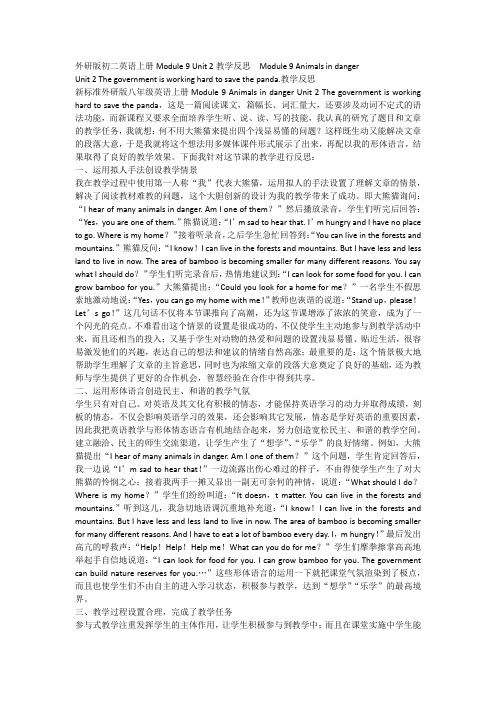
外研版初二英语上册Module 9 Unit 2教学反思Module 9 Animals in dangerUnit 2 The government is working hard to save the panda.教学反思新标准外研版八年级英语上册Module 9 Animals in danger Unit 2 The government is working hard to save the panda,这是一篇阅读课文,篇幅长、词汇量大,还要涉及动词不定式的语法功能,而新课程又要求全面培养学生听、说、读、写的技能,我认真的研究了题目和文章的教学任务,我就想:何不用大熊猫来提出四个浅显易懂的问题?这样既生动又能解决文章的段落大意,于是我就将这个想法用多媒体课件形式展示了出来,再配以我的形体语言,结果取得了良好的教学效果。
下面我针对这节课的教学进行反思:一、运用拟人手法创设教学情景我在教学过程中使用第一人称“我”代表大熊猫,运用拟人的手法设置了理解文章的情景,解决了阅读教材难教的问题,这个大胆创新的设计为我的教学带来了成功。
即大熊猫询问:“I hear of many animals in danger. Am I one of them?”然后播放录音,学生们听完后回答:“Yes,you are one of them.”熊猫说道:“I’m sad to hear that. I’m hungry and I have no place to go. Where is my home?”接着听录音,之后学生急忙回答到:“You can live in the forests and mountains.”熊猫反问:“I know!I can live in the forests and mountains. But I have less and less land to live in now. The area of bamboo is becoming smaller for many different reasons. You say what I should do?”学生们听完录音后,热情地建议到:“I can look for some food for you. I can grow bamboo for you.”大熊猫提出:“Could you look for a home for me?”一名学生不假思索地激动地说:“Yes,you can go my home with me!”教师也诙谐的说道:“Stand up,please!Let’s go!”这几句话不仅将本节课推向了高潮,还为这节课增添了浓浓的笑意,成为了一个闪光的亮点。
八年级英语外研版上册(考点剖析+典题精讲) Module 9 Animals in danger

初中英语考点剖析与典题精讲系列三点剖析单词·典句·考点danger []n. 危险【经典例句】In war,life is full of danger for everyone.在战争中,每个人的生活都危机四伏。
【考点聚焦】1) 派生词:dangerous adj. 危险的;反义词:safety n. 安全,safe adj. 安全的。
2)常见搭配:in danger在……危险之中;out of danger脱离危险【活学活用】1.用danger的适当形式填空1)Be careful,it’s too .2)He always helps people in .答案:1)dangerous2)dangerprotect []v. 保护【经典例句】He raised his arm to protect his face.他举起手臂护住脸部。
【考点聚焦】1)派生词:protection n. 保护2)常见搭配:protect...from/against...防止……遭受……;使……免于,保护……使……不受……【活学活用】2.选择填空We should (stop/protect) the trees from sand.答案:protectMainly[]adv.主要地,大体地【经典例句】This school is mainly for boys.There are only a few girls in it.这所学校主要招收男孩,女孩很少。
【考点聚焦】1)派生词:main adj. 主要的;mainly用于be动词前、助动词、情态动词之后,实义动词之前。
2)同义词辨析:mainly 强调从重要性上来划分,和次要对应,如:He mainly learns Chinese here.他来这儿主要为学汉语。
mostly强调从数量上划分,与少数对应,如:The people in the street were mostly tourists.街上的人大部分是游客。
八年级英语上册 考点剖析+典题精讲 Module 9《Animals in danger》教案 外研版

[]n.危险In war,life is full of danger for everyone.每个人的生活都危机四伏。
派生词:dangerous adj.危险的:safety安安全的。
:in danger在……危险之中;out of danger脱离危险1.用的适当形式填空1)Be careful,it’2)He always helps people in .[保护He raised his arm to protect his face.他举起手臂护住脸部。
派生词:protection 保护:protect...from/against...防止……遭受……;使……免于选择填空We should (stop/protect) the trees from sand.[主要地,This school is mainly for boys.There are only a few这所学校主要招收男孩1)派生词主要的词、情态动词之后:mainly 强调从重要性上来划分他来这儿主要为学汉语。
:The people in the street were mostly tourists.[原因Please tell me the reason for such a mistake.请向我解释一下你犯这样一个错误的原因。
常用搭配:the reason for...……的原因后接名词或从句:the reason for you are late你迟到的原因。
:Too much work is no excuse for 工作太忙不能成为不学习的理由。
[提供We provide food for the hungry children.我们为饥饿的孩子们提供食物。
常用搭配:provide sb.with sth.向某人提供某物,provide us with food.如经典例句所示。
翻译句子Sheep us wool.provide;with发现,查明Can you find out who broke the window?你能查出是谁打破窗户的吗同义词辨析:find强调结果“找到”;find out强调通过观察或强调过程“寻找”。
module9animalsindangerunit1教案外研版八年级上

Module9 Animals in dangerUnit 1 We need to protect animalsLanguage goals 语言目标1.Key vocabulary 重点词汇danger, protect, orange, cousin, brown, reserve, mad, surprising, kill, absolutely, hard, away, dirty, awful, peace, find out, rare, example, nature, nature reserve, surprised, at last, on earth2.Key structures 重点句式I was so excited to see the pandas at last.It was (not) interesting / sad/ right/ hard to do sth.need/ decide(not) to do sth.The surprising thing was to hear how many animals are in danger.Ability goals 能力目标To understand conversation about animals in dangerTo listen for specific wordsTo learn new wordsTeaching methods 教学方法Formal and interactive practice ,task-based actititiesTeaching aids 教具准备Tape recorder. Multi-mediaTeaching procedures and ways 教学过程与方式Step I:Warming-up / lead-in(1: P72)Talk about the animals by the pictures.Teach some new words: orange ,brown ,in danger ,protect ,cousinStep II:Listening and reading (2—5: P72—73)ListeningFirst ask students to read the questions in activity 2 and get them to take notes while listening. Then listen and check the answers.Then ask them to listen to the conversation between Lingling and Sally carefully with their books closed. And then answer the questions in activity 4.ReadingAsk students to read after the tape first. Work in pairs and read the conversation repeatedly and then ask some pairs to act out the conversation.Step III:practiceGo through Part 3 .at last = in the ende.g. He got good marks at last .They ate roast duck at last .think about…3 . It makes me mad.Phrase : make sb / sth + adj.e.g. The news made her happy .Who made the classroom dirty ?4. be in dangere.g. The little boy was in danger just now.We are going to be in danger .5 .take away… ( take it / them away )e.g. Look , he is taking away the books .= Look , he is taking the books away .6. We need to protect them better.Phrasse : ( not )need to do sthe.g. He needs to buy neew pen .We didn’t need to clean the classroom yesterday.7. decide ( not ) to do sthe.g. They decide to take some photes of animals.Sally decided not to travel by train .8 . on earthe.g. What on earth are you doing here ?Where on earth is he going ?9 . find oute.g. Try to find out when the ttrain leaves .Yesterday we find out who took the book away .10 . Translate the sentences according to Part 3 .It was interesting to learn about the Wolong Panda Reserve .It’s sad to think about those animals in danger.It’s hard to stop the killing .It’s not right to kill whales or eleghants for their meat .Structure : It’s + adj. + ( for sb ) + to do sthe.g. It’s interesting for us to see English films .It’s not easy for her to play the piano well .Complete the sentences according to Part 3 :It makes me madThe surprising thing was to hear how many animals are in danger . … and we are taking away their lands and forests.What on earth can we do ?Let’s find out what can we do to savve them .I was so excided to see the pandas .I t’s hard to stop the killing.It’s not right to kill whales or elephants .Many animals have no place to live in .We need to protect them better .Many people decide not to think about it .Step IV:Everyday EnglishGet Ss to practise them .Step V:Everyday English and Summary.Read the phrases with the whole class and have them repeat. Homework : Do activity 5at page 73板书设计:Module 9 Animals in dangerUnit 1 We need to protect animals.1.danger2.protect3.cousin4.nature reserve wrong kill the whale5.take away It’s important to protect the pandas.6.dirty unhealthy drink dirty water7.awful8.peace stop the killing9.find out We need to built nature reserves10.rare made water clean。
八年级英语上册 Module 9 Animals in danger Unit 1 We need

南极大冒险
Protect them!
Humans (人类) and animals are friends. We should live in peace (和平相处).
Interesting sentences!
Task 5: Investigation! Why are some animals in danger?
Task 6:Listening competition!
Q:Why do people kill whales and elephants?
A.They kill them for their meat. B.They kill them for fun. C.They don’t like whales or elephants.
Task 7: Learn by yourself and answer.
1.Are they talking after they visited the zoo? Yes, they are.
2.Has Sally ever seen the pandas before? No, she hasn’t.
Where do they live? two pandas
卧龙熊猫自然保护区
Wolong Panda Reserve
世界自然基金会
Task 1: Brain-storming! What animals do you know?
animal
Task 2: Guessing game! It is orange and black. It can run very quickly. It likes to eat meat, not grass.
module9《animalsindanger》词组(外研版初二上)
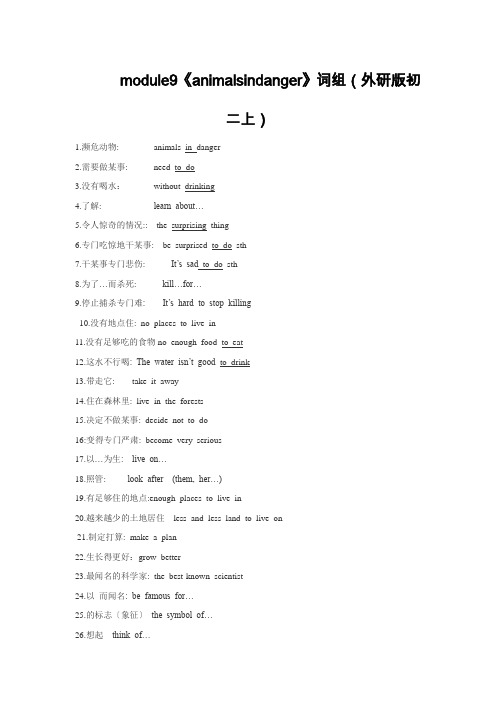
module9《animalsindanger》词组(外研版初二上)1.濒危动物: animals in danger2.需要做某事: need to do3.没有喝水:without drinking4.了解: learn about…5.令人惊奇的情况:: the surprising thing6.专门吃惊地干某事: be surprised to do sth7.干某事专门悲伤: It’s sad to do sth8.为了…而杀死: kill…for…9.停止捕杀专门难: It’s hard to stop killing10.没有地点住: no places to live in11.没有足够吃的食物no enough food to eat12.这水不行喝: The water isn’t good to drink13.带走它: take it away14.住在森林里: live in the forests15.决定不做某事: decide not to do16:变得专门严肃: become very serious17.以…为生: live on…18.照管: look after (them, her…)19.有足够住的地点:enough places to live in20.越来越少的土地居住less and less land to live on21.制定打算: make a plan22.生长得更好:grow better23.最闻名的科学家: the best-known scientist24.以而闻名: be famous for…25.的标志〔象征〕the symbol of…26.想起think of…27.考虑: think about (it)28.例如: for example / such as…29.几乎没有熊猫very few pandas.30.也,同样as well as…31.你真是太好了干某事It’s really nice of you to do…32.向某人展现某物show sb about sth..33.干某事的一个打算: a plan to do sth…34.设计海报design a poster35.保持…洁净: keep sth clean36.保持地球的洁净: keep the Earth clean37.砍伐森林: cut down the forests38.污染河流: pollute the rivers39.为某人而工作: work for sb40.在野外: in the wild41.怎么讲: on earth42.听到那个消息专门难过:I/m sorry to hear that.43.使得某人发狂: make sb mad44: 把它变脏: make it dirty45. 查找它: find it out46.和平地生存:live in pease.47.自然爱护区: nature reserve48.最后: at last49.干某事是有味的: It’s interesting to do50.需要爱护: need to protect…51.变得稀少: become rare52.最濒危的动物之一one of the animals most in danger 53.出生:be born54.由于许多不同的缘故:for many different reasons。
外研版八上《Module 9 Animals in danger》word复习资料

Module9 Unit1复习资料1.需要need to d o sth. /need +n. / pron.2. protect sb. / sth. 保护,防护某人/某物protect sth.from sth. / doing sth. 保护sth. 免受sth.的伤害5. live in +地方住在……里9. 有with (doing) sth. ; 没有without (doing) sth10. Which animals … 哪种动物……11. talk about sth. 谈论关于……12. in danger处于危险中13. Sb. be excited to do sth. 做某事是激动的.14. at last最后=finally=at the end15. know about 了解16. think about 考虑17. make sb. mad使某人感到极度激动的make sb. do sth. 使某人做某事make sb. adj.使某人变得怎么样18. It's hard to do sth. 做某事是难的.21. grow bigger发展得更大停止某事stop sth. 停止做某事stop doing sth. 停下来去做某事stop to do sth.19. have no place to live in.没有地方生活.20. The surprising thing 令人惊讶的事情.surprising 修饰物; ,surprised 修饰人22. take away带走,拿走24. Sth. isn't good to do sth. 某物是不适宜做某事的25. really awful.真的令人讨厌.reall y 放于行为动词,形容词,定冠词前26. live in peace住在安宁中27. 决定(不)做某事decide (not ) to do sth.28. on earth到底29. find out 找出, 发现33. become rare变得稀少30. Wha t is the matter with sb. =What is wrong with sb. 某人出什么事了31. too … to… 太……而不能……32. too many animals太多动物too many+可数名词复数太多too much + 不可数名词34.examples of sth. …例子for example 例如= such as36. I am sad / happy / sorry /to do sth.做某事令我感到悲伤/高兴/抱歉/惊奇的.Module9 Unit 2复习资料1.努力工作work hard2. one of the animals most in danger.最危险的动物之一.One of +可数名词复数:某物之一, 表单数后接动词单数3. about 1,000大约一千4. nature reserve自然保护区5. zoos and research centres动物园研究中心6. look after照顾=take care of7. Southwest China中国西南地区8. live on 以……为食/ 生9. each +名词后接动词第三人称单数形式每个……11. become smaller变得更少12. different reasons不同原因13. less and less 接不可数名词fewer and fewer接可数名词more and more 越来越多形容词的比较级+and+比较级:越来越……15. more than超过,多于=over22. in the world在世界上16. enough food足够的食物enough放于名词前,放于形容词后big enough17. make a new plan 制定一个新计划18. grow better生长得更好19. go back回去20. mos t people大多数人21. one of + 最高级+名词one of ……之一其中最…的某物之一24. still a long way to do sth. 做某事仍需走很长的路.a long way to go 路还很长,还需要努力25. think of 想想,认为;后接动词ing形式,或名词26. such as例如=for example, for instance27. try to do sth.努力做某事28. make sure+句子保证……Module9 Unit 3复习资料动词不定式由"to+动词原形"构成,否定形式是"not + to+ 动词原形",1. It is / was + adj.形容词+ to do sth.做某事是怎么样的.2. We / They /are,were +adj. 形容词+ to do sth. 做某事令我们感到怎么样.3. He / She +is a dj. 形容词+ to do sth.4. want to do sth.想做某事.5. It is nice of you to do sth.做某事对你来说是好的.6. invite sb. to do sth.邀请某人去做某事7. What time … 什么时候,几点…….8.h alf past four4点半9.let sb. do sth.让某人做某事.10. make sb. do sth.使某人做某事.11. make sb. + adj.使某人变得……12.show sb. sth.=show sth. to sb.展示, 出示……13. stop doing sth.停止做某事14. s top to do sth.停下来去做某事15. tell sb. sth.=tell sth. to sb.告诉……16. tell sb. (not) to do sth.告诉某人做某事17. design a poster 设计一份海报18. endangered animals濒危动物19. make jewellery 制造珠宝20. provide sth. for sb. 向某人提供……21.保持:keep sth. + adj.保持某物怎么样keep doing sth.保持做某事22. pollute rivers污染河流23. cut down 砍下24.surprised, interested, excited用于修饰人;I am excited about the panda reserves.surprising, interesting, exciting用于修饰物The book is interesting.25. the cause of sth. 某物的原因。
- 1、下载文档前请自行甄别文档内容的完整性,平台不提供额外的编辑、内容补充、找答案等附加服务。
- 2、"仅部分预览"的文档,不可在线预览部分如存在完整性等问题,可反馈申请退款(可完整预览的文档不适用该条件!)。
- 3、如文档侵犯您的权益,请联系客服反馈,我们会尽快为您处理(人工客服工作时间:9:00-18:30)。
初中英语考点剖析与典题精讲系列三点剖析单词·典句·考点danger []n. 危险【经典例句】 In war,life is full of danger for everyone.在战争中,每个人的生活都危机四伏。
【考点聚焦】 1) 派生词:dangerous adj. 危险的;反义词:safety n. 安全,safe adj. 安全的。
2)常见搭配:in danger在……危险之中;out of danger脱离危险【活学活用】 1.用danger的适当形式填空1)Be careful,it’s too .2)He always helps people in .答案:1)dangerous 2)dangerprotect []v. 保护【经典例句】 He raised his arm to protect his face.他举起手臂护住脸部。
【考点聚焦】 1)派生词:protection n. 保护2)常见搭配:protect...from/against...防止……遭受……;使……免于,保护……使……不受……【活学活用】 2.选择填空We should (stop/protect) the trees from sand.答案:protectMainly[]adv.主要地,大体地【经典例句】 This school is mainly for boys.There are only a few girls in it. 这所学校主要招收男孩,女孩很少。
【考点聚焦】 1)派生词:main adj. 主要的;mainly用于be动词前、助动词、情态动词之后,实义动词之前。
2)同义词辨析:mainly 强调从重要性上来划分,和次要对应,如:He mainly learns Chinese here.他来这儿主要为学汉语。
mostly强调从数量上划分,与少数对应,如:The people in the street were mostly tourists.街上的人大部分是游客。
reason []n. 原因【经典例句】 Please tell me the reason for such a mistake.请向我解释一下你犯这样一个错误的原因。
【考点聚焦】 1)常用搭配:the reason for...……的原因,后接名词或从句,如:the reason for you are late你迟到的原因。
2)同义词辨析:excuse指借口、托辞,如:Too much work is no excuse for not studying.工作太忙不能成为不学习的理由。
Provide []v. 提供【经典例句】 We provide food for the hungry children.我们为饥饿的孩子们提供食物。
【考点聚焦】常用搭配:provide sb.with sth.向某人提供某物,如:They provide us with food.他们供给我们食物。
还可说provide sth.for sb.,如经典例句所示。
【活学活用】 3.翻译句子羊供给我们羊毛。
Sheep us wool.答案:provide;with短语·典句·考点find out 找出,发现,查明(真相等)【经典例句】 Can you find out who broke the window?你能查出是谁打破窗户的吗?【考点聚焦】同义词辨析:find强调结果“找到”;find out强调通过观察或询问查明(某事);look for强调过程“寻找”。
【活学活用】 4.选词填空find/find out/look for1)I’ve my pen everywhere,but I can’t it.2)Can you more ways to solve the problem?答案:1)looked for;find 2)find outlive on 以……为食【经典例句】 Sheep live on grass.羊以草为食。
【考点聚焦】1)live on后接名词,同义词组是live by doing sth.靠……为生。
2)on在短语中的意思是“依赖”,类似短语还有depend on依赖于,取决于。
3)live in是“居住在某地”,如:He lives in London.他住在伦敦。
less and less 越来越少【经典例句】 The food is less and less in winter.冬天食物越来越少了。
【考点聚焦】1)less and less用来修饰不可数名词,修饰可数名词用fewer and fewer。
2)“比较级+and+比较级”这一结构,意思是“越来越……”,如:In spring,it’s warmer and warmer.春天天气越来越暖和。
【活学活用】5.根据括号内汉语提示完成句子The pollution in the world is (越来越多),but the water is (越来越少) .答案:more and more;less and lessmake a plan to do...计划做……【经典例句】 We’ve made a plan to go abroad for vacation.我们已定好出国度假的计划。
【考点聚焦】 1)短语中的plan是名词,make a plan是“制订计划”。
2)plan还可作动词,常用搭配是plan to do sth.和plan on doing sth.。
【活学活用】 6.用所给词的适当形式填空They are planning (build) a new office building.答案:to buildsuch as...例如……,像这种的【经典例句】 Food such as hamburgers is junk food.像汉堡这类的食品是垃圾食品。
【考点聚焦】 1)such as用在句中类似于like。
2)同义词组辨析:such as表示列举事物,for example是举例说明,后面往往加逗号,如:Put on your cool clothes,for example,a T shirt and shorts.穿上凉快衣服,比如T恤衫和短裤。
think of 想起【经典例句】I can’t think of his name at the moment.我一时想不起他的名字。
【考点聚焦】1)要注意这里的of是介词,后面要接代词或动名词。
2)要记住think为中心的一些短语:think about 考虑think over 仔细思考think up 想出【活学活用】 7.用所给词的适当形式填空We are thinking about (go) to France.答案:going句子·剖析·拓展There are about 1000 pandas living in nature reserves today.如今有大约1000只大熊猫生活在自然保护区里。
【剖析】这是个there be句型,There are和后面的living in共同作谓语,意思是有……生活 在……【拓展】这是there be sb./sth.doing sth.的结构,表示“某地有某人(物)在干什么”,这里的实义动词应用v.-ing形式,表示正在进行的动作或习惯性的状态。
There are 400 Engineers working for Shenzhou Ⅵ now.现在有400位工程师为神舟六号工作。
There are more than 30 nature reserves to protect pandas but these are not enough. 现有30多个自然保护区来保护大熊猫,但这些还不够。
【剖析】这是个由but连接的并列句,前面是个there be句型,to protect pandas是不定式作定语,修饰nature reserves。
【拓展】 more than相当于over,表示“超过,多于”,其反义短语为less than少于,不到。
There are less than 40 students in the classroom.教室里有不到40个学生。
Pandas born in zoos may go back to live in the nature reserves.出生在动物园里的大熊猫可能会回到自然保护区里生活。
【剖析】 1) 这是一个简单句,主语是pandas born in zoos,其中born in zoos是过去分词作定语修饰pandas,may表示可能。
2)不定式短语to live in...作目的状语。
【拓展】情态动词may除表可能外,还可表示请求许可、能够或表达祝愿。
May you succeed!祝你成功。
There is still a long way to go to save the panda.仍需继续努力来拯救大熊猫。
【剖析】 a long way to go 表示“路还很长,还需要努力”;to save t he panda表目的。
【拓展】注意不定式的语法功能。
(详见语法·剖析)语法·剖析不定式用法之一一个句子的主要动词之后采用“to+动词原形”的结构称为动词不定式,它没有人称和数的变化,在句中不能作谓语,那么它表示什么意思,起何作用呢?一块儿来看一下吧!典题精讲经典题型阅读短文,掌握大意,然后从所给四个选项中选择正确答案。
Now people are trying to make the world a better place for birds to live in.People in China start the Bird Loving Week.Students from all parts of the country have been doing something to care for birds.Meng Yiru,a 16-year old student from Nanyang Model High School in Shanghai,asked people to protect birds:Never put birds in cages.Go to visit them in the wild if you really love them.“I’ll never forget the little sparrow(麻雀) I kept in a cage,”said Meng.“It stopped eating after I caught it and soon died.”Men g and her classmates put many of their ideas in their 300 word report to ask people to take better care of birds.China is the home of more than 1000 kinds of birds because the country is large and has almost every weather type to suit them.But not everyone knows how to take good care of them.Some cut down trees and destroy the birds’ homes.This has made the number of the birds go down quickly.A study shows that one out of eight birds,more than 1200 kinds,in the world could die out.This includes 95 percent of albatrosses (信天翁) and 60 percent of cranes(鹤).Some birds you see every day,like pigeons and parrots,are also in danger!To help them,people have set up 7500 reserves which are suitable and safe for the birds.In China,there are big reserves like the ones near the Dongting Lake in Hunan and the Poyang Lake in Jiangxi.Is there anything that you can do for birds?Take care of their homes.Feed them with something delicious.Well,think it over and begin to do it now!1.China is the home of many kinds of birds because .A.people in China love birdsB.people in China have planted a lot of treesC.people in China don’t eat birdsD.it is large and has almost every weather type to suit them思路解析:此题题意是“为什么中国是各种鸟儿的家园?”文章第三段揭示了因为我国气候多样,幅员辽阔,适合各类鸟儿的生存。
